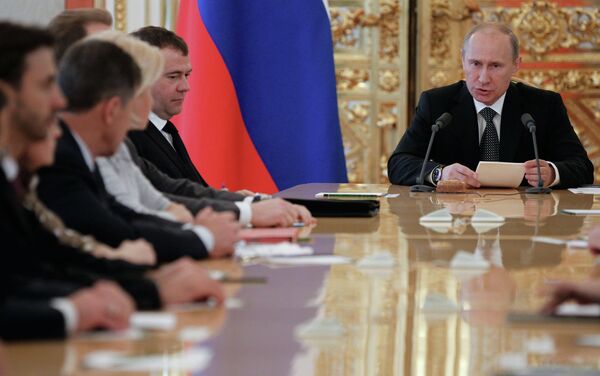Russia should take measures to insulate its budget against sharp world energy price fluctuations, President Vladimir Putin said in his budget address on Thursday.
“The non-oil and gas revenue deficit is too large. The problems and challenges that we face are to stimulate economic growth, implement large-scale social programs and at the same insulate the budget against sharp energy price fluctuations,” Putin said, presenting Russia’s budget policy guidelines for 2013-2015.
Heavily reliant on raw material exports, primarily oil and gas, Russia has been pushing economic diversification, and trying to promote higher added value production.
Putin said he had instructed the government to set aside funds in the 2013 budget that could be used to implement anti-crisis measures, if global negative economic trends persisted.
“We must necessarily take into account any scenarios in the development of the global and domestic economies and have instruments and possibilities for a prompt response. That is why I propose setting aside a sufficient reserve in next year’s budget for anti-crisis measures, if, of course, there emerges a need for it,” Putin said.
Once Russia introduces a budgetary rule on oil prices from 2013, Russia’s budget deficit should not exceed 1 percent of GDP, if the actual oil price corresponds to the budgeted basic price, the budget guidelines said.
“When planning federal budget expenditures, it is expedient to make projections using the basic average oil price for a five-year period with the annual increment of the calculation period by one year until this period reaches 10 years. Maximum federal budget spending should not exceed revenues in terms of the basic [oil] price by more than 1 percent of gross domestic product,” the guidelines said.
Russia’s Finance Ministry proposed introducing from 2013 a budgetary rule under which spending should be planned on the basis of the basic oil price calculated for the past five years in 2013, the past six years in 2014 and so on, until the basic price is calculated for the past ten years.
Putin said if the actual oil price is higher than the basic price, extra revenues should be channeled into the Reserve Fund. If the actual price was lower, Reserve Fund resources should be used to cover the federal budget deficit.
Only Prime Minister Dmitry Medvedev should have the right to employ and manage anti-crisis mechanisms stipulated in the budget, Putin said.
He also said it was right to keep the current level of taxation in the non-raw material sector unchanged in order to stimulate economic diversification.
The budget guidelines for 2013-2015 stipulate that the tax burden on the non-commodity sector will remain unchanged at least to 2018.
“Considering our tasks of reducing dependence on raw materials, I believe it right not to raise and keep the existing level of the tax burden on the non-raw material sector. It is short-sighted, irrational and dangerous to impose any additional burdens on it,” Putin aid.
The budget guidelines say the development of the tax system should meet the goals of Russian economy diversification.
“That is why, the tax burden on the non-raw materials sectors of the economy will not be raised at least until 2018. After Russia’s Federal Assembly adopts changes to the national tax legislation on tax rates in 2012, I propose basic tax rates should not be changed,” he said.
Taxes in Russia could be reduced, if there were fewer cases of tax evasion, the budget guidelines said.
“The Russian government should take concrete measures to fight tax evasion, proceeding from the fact that if tax revenues increase as a result of anti-tax evasion measures, decisions may be made on reducing the existing tax burden,” the budget guidelines said.
Putin also instructed the government to start work promptly on creating a Russian Financial Agency to raise yields from investing sovereign funds.
“I request you promptly work on creating a Russian financial Agency that would implement state policy in the field of managing sovereign funds and debt obligations,” he said.
Russia needs to employ a more flexible system of reserve management against a background of economic instability. Investments from the Reserve Fund and the National Welfare Fund into infrastructural projects could meet these requirements, he said.
Government officials should be accountable for budget overspending, Putin said.
“I believe we need to combine and link the implementation of social and economic polices with the fulfilment of the budget . If more money is spent than planned, and the goals have not been reached, we must make necessary conclusions, including personnel decisions,” he said.
The Russian government has agreed to set aside 500 billion rubles ($15.4 billion) in next year’s budget to directly finance anti-crisis measures if the eurozone crisis continues to escalate and spread, Finance Minister Anton Siluanov said on June 18.
The funds will be used to support “socially needy people” and “systemically important enterprises,” Siluanov said in an interview with The Financial Times.




